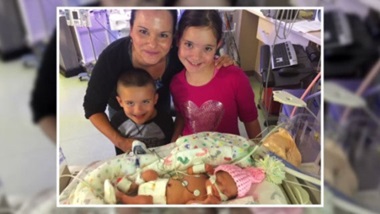Patient Story
Neonatal Intensive Care Unit (NICU): Giuliana and Nicholas's Story
Patient Story Highlights
- The Neonatal-Perinatal Medicine Fellowship Program at Johns Hopkins All Children’s Hospital trains the next generation of neonatologists.
- In October 2013, Daniel, Maggie and their physicians decided to deliver both babies early at 29 weeks after Nicholas experienced complications in utero. The twins were delivered at Bayfront Baby Place, on the third floor of Johns Hopkins All Children’s.
- There, the twins received care for respiratory, cardiac and gastrointestinal problems.

No parents want their child to spend time in the neonatal intensive care unit (NICU), although they are grateful that it’s there when needed. The NICU is the hospital unit where children receive lifesaving care after they are born prematurely, sometimes with serious health complications. St. Petersburg orthopaedic surgeon Daniel and his wife, Maggie, a business manager, experienced the NICU at Johns Hopkins All Children’s first-hand when their twins, Nicholas and Giuliana, spent four months there after a necessary premature delivery.
Doubly Grateful
In October 2013, Daniel, Maggie and their physicians decided to deliver both babies early at 29 weeks after Nicholas experienced complications in utero. The twins were delivered at Bayfront Baby Place, on the third floor of Johns Hopkins All Children’s. Nicholas and Giuliana were swiftly transferred to the 97-bed, Level IV NICU at Johns Hopkins All Children’s. There, the twins received care for respiratory, cardiac and gastrointestinal problems. For their parents, the experience was heart-wrenching.
“I envisioned my newborns wearing cute onesies surrounded by stuffed animals,” Maggie says. “It was very difficult seeing them covered in and surrounded by IVs, tubes and monitors.”
Throughout the twins’ stay in the NICU, Daniel and Maggie were comforted by the skill, communication and compassion of neonatologist Joana Machry, M.D., FAAP, and her team.
Today, Nicholas and Giuliana are 7 years old and thriving as happy, healthy second graders, and Daniel and Maggie’s gratitude has motivated them to support a passion project of Machry’s — the Neonatal-Perinatal Medicine Fellowship Program.
Shaping the Future of Neonatology
The three-year fellowship program is the culmination of more than a decade of education and training to equip neonatologists to care for some of the most fragile patients in medicine. Machry, the program’s director and an assistant professor of pediatrics in the Johns Hopkins University School of Medicine, developed the program with Aaron Germain, M.D., FAAP, associate program director. The Neonatal-Perinatal Medicine Fellowship Program enrolls two fellows per year. Fellows receive rigorous training that includes research and providing clinical care in the NICU.
“Our NICU is fellow-driven because the fellows are the first line of care,” Machry says. “When a medical issue arises, the nurse practitioners or bedside nurses call the fellows first. A supervising neonatologist is responsible for affirming the fellows’ decisions. The presence of these learners enhances the faculty’s knowledge. As they supervise and advise the fellows, our faculty must stay current with the medical literature. Knowledge circulates among everyone involved with the fellowship program, and that benefits patient care.”
In June 2021, the fellowship program celebrated one of its most important milestones: the graduation of inaugural fellows Noura Nickel, M.D., and Mariana Theodoro, M.D.
Nickel joined Johns Hopkins All Children’s and, like her mentor, Machry, will focus part of her career in medical education. She will engage in managing the NICU rotation for pediatric residents and participating at the Maternal, Fetal & Neonatal Institute education council for any medical education activities within the institute.
Proud of the team effort by faculty and staff to build the fellowship program from scratch, Machry views the work as a way to help countless babies beyond the walls of her NICU.
“I feel like I’m impacting the future of a larger number of neonates by training the next generation of neonatologists to keep high standards of care,” she says. “It’s my mission to affect the health of as many newborns as I can.”
Support from Johns Hopkins All Children’s Foundation has helped make that mission possible. Longtime NICU supporters Daniel and Maggie are proud to play a key role in the Neonatal-Perinatal Medicine Fellowship Program’s success through donations to Johns Hopkins All Children’s Foundation.
“As a member of the medical profession, I’m keenly aware of the extensive training and resources required to run a top-tier program,” Daniel says. “We didn’t want resources or personnel constraints to ever limit the care a child in need receives. Furthermore, the neonatologists in the NICU are in the unique position of being able to impact a baby’s entire life. Their care will make a difference that lasts a lifetime.”
Learning with Head, Hands and Heart
What does the Neonatal-Perinatal Medicine Fellowship Program at Johns Hopkins All Children’s Hospital entail? In the first year of the three-year program, fellows devote themselves to caring for seriously ill babies in the neonatal intensive care unit (NICU). They attend deliveries, perform resuscitations, coordinate emergency procedures and manage mechanical ventilation. Fellows also practice complex cases in the NICU’s simulation laboratory.
During their second and third years, fellows engage in research or patient safety and quality improvement projects. This work allows them to develop expertise in an area of interest within the field of neonatal-perinatal medicine by getting involved with one of the hospital’s expert teams, such as those focused on lung protection and neonatal abstinence syndrome.
To learn more about our NICU or the Neonatal-Perinatal Medicine Fellowship Program, call us at 727-767-7061.





